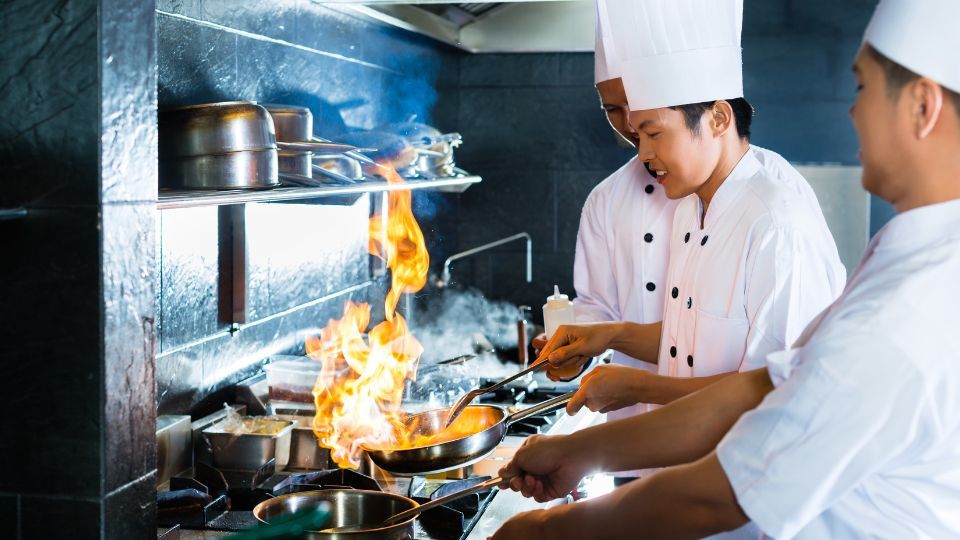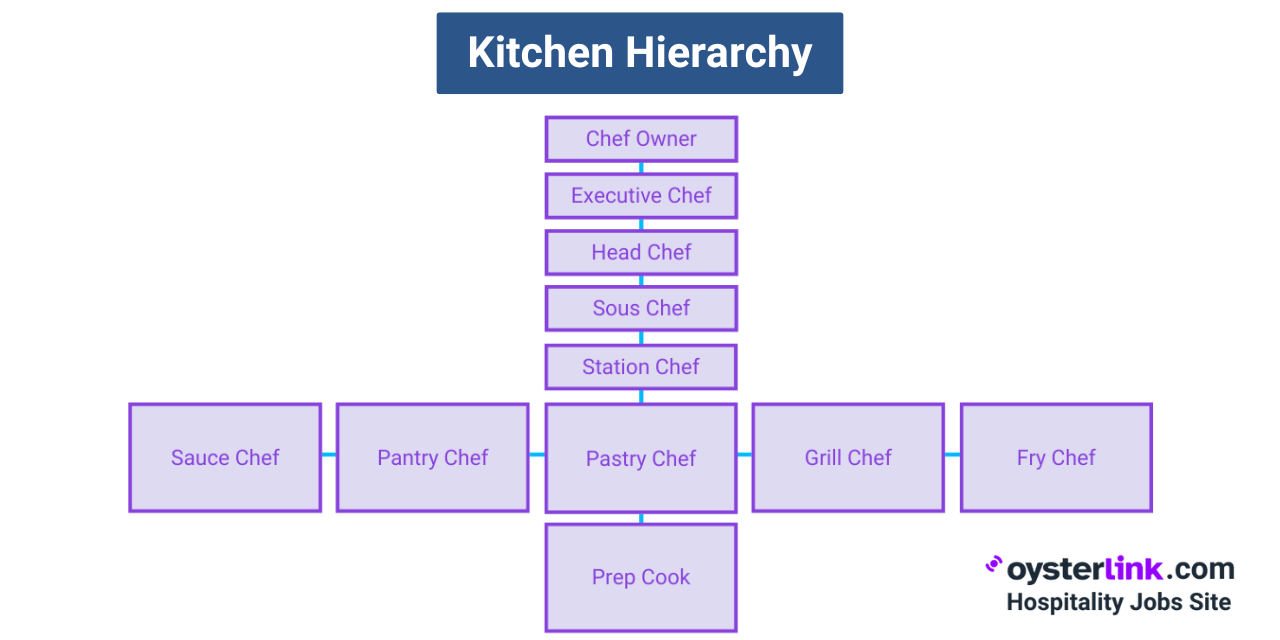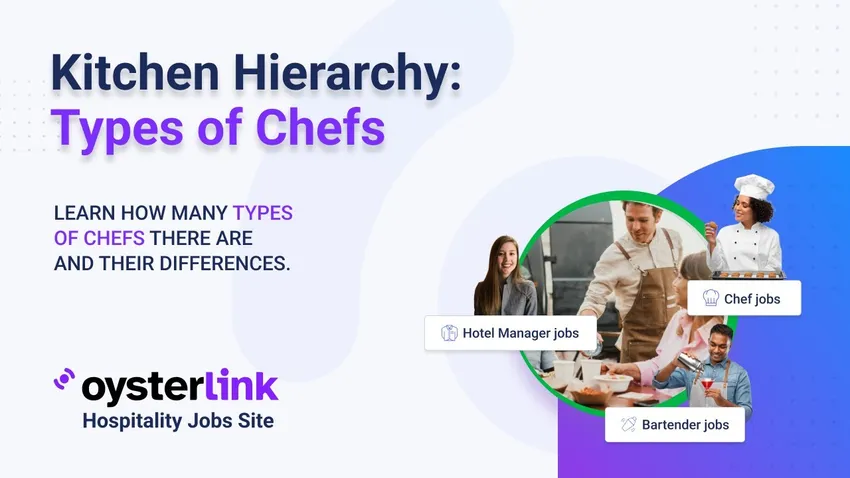Kitchen Hierarchy: Key Findings
- The kitchen hierarchy gives Cooks a clear path from entry-level to leadership roles.
- Moving up requires strong skills, experience and the ability to lead others.
- Chefs can grow beyond cooking into management or owning a restaurant.
The kitchen hierarchy, known as the Brigade de Cuisine, is the system that organizes chefs and cooks by rank and responsibility.
Each role within this structure—from prep cook to executive chef—has a defined purpose that keeps a busy kitchen running smoothly.
Entry-level chefs focus on preparation and supporting tasks, while senior chefs oversee stations, train staff, and manage operations.
Together, these roles form a clear career ladder that allows chefs to grow from hands-on cooking into leadership and management.
Understanding the Kitchen Hierarchy and Chef Roles
The kitchen hierarchy is essential because it creates order in high-pressure environments where timing and precision are everything.
By assigning specialized duties, kitchens can deliver consistent quality while giving Chefs a roadmap for professional growth.

"Chef" is a broad term used to describe a wide range of kitchen workers.
Depending on their place in the kitchen hierarchy, they may be responsible for preparing specific dishes or managing entire sections of the menu.
That being said, here are the types of Chefs you'll typically find in professional commercial kitchens.
Types of Chefs and Their Place in the Kitchen Hierarchy
To help you distinguish between each type of Chef and their duties, we created this easy-to-understand infographic.
Not only does this infographic represent the hierarchy in a commercial kitchen, but it also showcases the career progression of Chefs.

Prep Cook's Position in the Kitchen Ladder
As the name implies, the Prep Cook is in charge of food preparation. Prep Cooks are also typically known as kitchen assistants or kitchen porters. Their main responsibilities revolve around preparing ingredients, such as chopping vegetables and making sure the kitchen is organized and well-stocked.
Although their work may have little to do with actual cooking, they're extremely important for ensuring dishes are prepared timely and they satisfy establishment standards.
Fry Chef's Position in the Culinary World
Fry chefs are also known as frituriers. They're in charge of frying food using fryers. Although it may sound like an easy thing to do, frying food like french fries, onion rings and chicken is quite delicate. It needs to be done at the right temperature and for the right amount of time.
Fry Chefs often fry multiple items at a time using multiple fryers. That’s why they need to be excellent at multitasking and paying attention to multiple things at once.
Pastry Chef's Role in the Kitchen
Pastry chefs specialize in making pastry, baked goods and desserts. Pastry chefs generally work in bakeries, hotels, cafes and restaurants where they create tasty and visually appealing sweets and deserts. Pastry chefs usually have experience in French or English pastries.
Grill Chef's Position in the Kitchen Hierarchy
Grill Chefs, as their name implies, specialize in grilling food. Their work includes managing grills by making sure they're at the right temperature for every type of food being grilled. Some of the food they need to grill include seafood, meat and vegetables.
Grill chefs work at steakhouses, barbeque joints and restaurants. They need to know how to make rare, medium-rare, medium, medium-well and well-done steaks. While it sounds easy, it takes time to master the art of cooking steaks.
Pantry Chef's Position in the Kitchen Ladder
Pantry Chefs are responsible for preparing appetizers, cold dishes, salads and charcuterie. While these dishes may seem simple, creativity is essential to make them visually appealing. Pantry Chefs often use intricate decorations and garnishes to elevate presentation and impress diners.
Freshness is also a top priority, as ingredients must always be high quality and never stale. For a quick look at what a Pantry Chef does in action, watch this short TikTok video.
Sauce Chef's Role in the Kitchen Hierarchy
Also called Sauté Chefs or sauciers, these Chefs specialize in sauces and side dishes. They must master flavors, textures and consistencies to enhance every plate. They use sauté pans to cook meats and vegetables quickly over high heat, requiring speed and precision. In some restaurants, they also prepare stews and soups.
All of the aforementioned Chefs fall into the Commis Chef category. They're junior-level Chefs that help the Chefs that we're now going to talk about.
Station Chef's Position in the Culinary World
Also known as Senior Chef or Chef de Partie, this type of Chef is responsible for specific sections or stations of the kitchen. They can be responsible for overseeing some or all of the aforementioned chefs.
Station Chefs are knowledgeable and experienced. Not only do they oversee other Chefs, but they also train and lead junior Chefs. They also prepare dishes and check for quality and consistency.
Sous Chef's Role in the Kitchen Hierarchy
Sous Chefs, often called second Chefs or under Chefs, are second in command after the Head Chef. They play a crucial role in the kitchen hierarchy, ensuring smooth operations and consistent standards.
Similar to Station Chefs, they supervise staff and coordinate all kitchen employees so every dish is prepared correctly. They are also responsible for enforcing food safety practices and maintaining quality control across all stations.
To see what a Sous Chef’s role looks like in practice, check out this TikTok video.
Head Chef's Importance in the Kitchen
Also called Chef de Cuisine, a Head Chef is the highest-ranking Chef who is hands-on with kitchen operations. He's responsible for controlling inventory, making orders, training and managing other kitchen staff.
Head Chefs build strong relationships with staff, vendors and management to keep the kitchen running smoothly. While they step in when needed, most daily operations are handled by the Sous Chef.
Executive Chef - The Alpha Role in the Kitchen Hierarchy
An Executive Chef oversees all kitchen operations. Executive Chefs often oversee multiple kitchens and manage multiple Head Chefs.
In most restaurants, Executive Chefs create and plan menus, develop new recipes and manage staff.
Executive Chefs focus more on administration than Head Chefs. The role requires years of experience, formal training and strong leadership to ensure quality, consistency, and innovation.
Chef Owner
Also known as a Group Chef, this is a Chef who has been in the business long enough to also grasp the business side of running a restaurant. The Chef Owner is responsible not only for kitchen operations, but hiring and finances as well.
To be a successful Chef Owner, you need to have a lot of experience managing a kitchen, you need to make your menu stand out, and you need to have the business acumen to make the right decisions not just for the kitchen, but for the entire business as well.
Kitchen Hierarchy: Final Word
Whether you're a Cook working your way to becoming an Executive Chef someday or a hospitality employer looking to build a reliable and skilled kitchen team, OysterLink is your go-to hiring platform.
On OysterLink, candidates can find Chef jobs at every level, while employers can post openings that reach a focused network of culinary professionals. Click on the buttons below to discover your next career move or find the perfect addition to your kitchen team at OysterLink.









Loading comments...